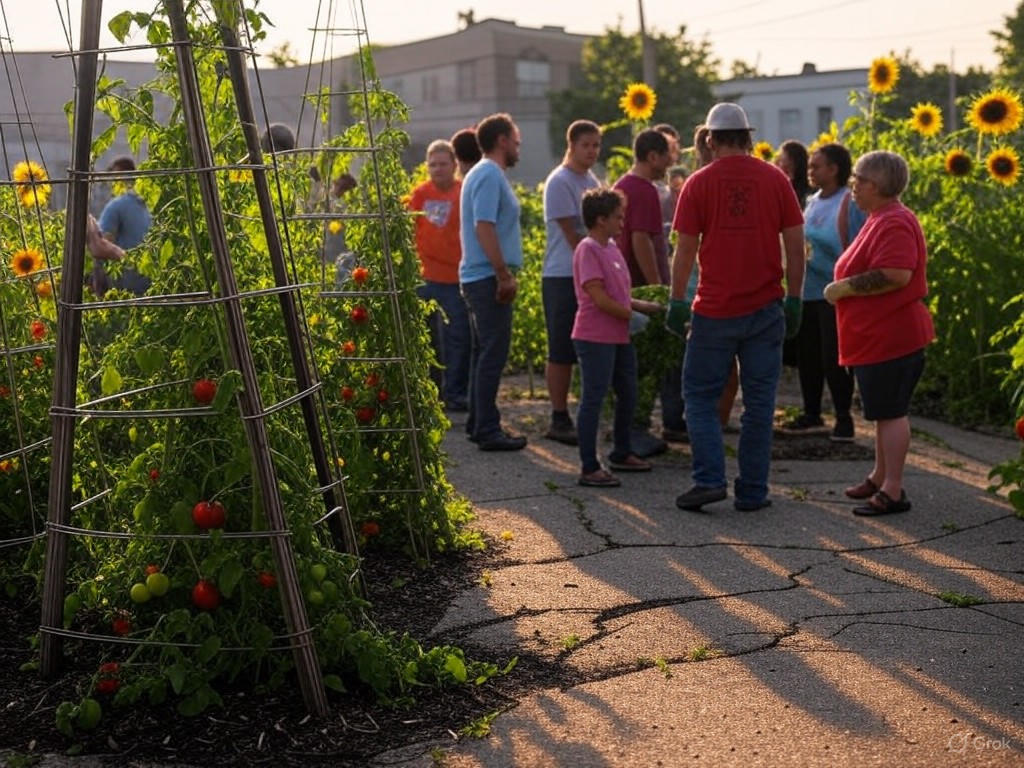Community Gardens in Detroit: Urban Renewal
In the heart of Detroit, where the ghosts of assembly lines still echo through abandoned factories, a quiet revolution is taking root—literally. Picture this: rows of tomato vines climbing makeshift trellises, sunflowers towering over cracked pavement, and neighbors swapping stories over freshly harvested greens. It's not the stuff of utopian dreams, but rather a testament to what happens when folks roll up their sleeves and reclaim their communities. Detroit's community gardens aren't just patches of earth; they're symbols of resilience, blending old-school grit with modern ingenuity. As we delve into this phenomenon, we'll see how these green oases are fostering urban sustainability and renewal, all while championing the kind of self-reliant spirit that built America in the first place.
From a center-right lens, the rise of community gardens in Detroit underscores the power of free-market principles and individual initiative over heavy-handed government intervention. Sure, we've all heard the tales of urban blight, but what's often overlooked is how local entrepreneurs and volunteers are turning the page without waiting for bureaucratic red tape. These gardens promote food equity not through top-down mandates, but by empowering residents to grow their own sustenance, fostering a sense of ownership and traditional community values that hark back to our agrarian roots.
The Seeds of Revival: A Closer Look at Detroit's Urban Landscape
Detroit, once the pulsating engine of American industry, has faced its share of hardships. Decades of economic downturn left vast swaths of the city dotted with vacant lots, a stark reminder of manufacturing's decline. Enter community gardens: small-scale, volunteer-driven plots that have sprouted across neighborhoods like Highland Park and Brightmoor. These initiatives aren't flashy government programs; they're grassroots efforts where residents lease or donate land, often partnering with local nonprofits or businesses to cultivate fresh produce.
What makes this movement tick is its emphasis on sustainability and renewal through private action. Take, for instance, the transformation of blighted areas into productive green spaces. A study by the University of Michigan's Ford School of Public Policy highlights how community gardens have reduced food deserts—areas lacking access to affordable, nutritious food—by as much as 30% in certain ZIP codes. This isn't about redistributing resources from on high; it's about individuals stepping up, much like the pioneers who tilled the Midwest soils a century ago.
One can't help but chuckle at the irony: while some cities pour millions into subsidized urban farms that fizzle out, Detroit's model thrives on minimal oversight. Volunteers organize through local associations, bartering seeds and tools in a free-market microcosm. This approach aligns with traditional values of self-reliance, where the reward isn't a government check but the satisfaction of a bountiful harvest. 
Analyzing the Impact: Blossoming Benefits and Economic Ripples
Digging deeper, the analysis reveals that community gardens are more than just aesthetic upgrades; they're economic catalysts. In Detroit, these gardens have been linked to increased property values and reduced crime rates, as neighbors invest time and effort into shared spaces. A Wall Street Journal report on urban renewal notes that areas with active gardens see a 15–20% uptick in home sales, attributing this to the "neighborhood effect"—a term for how well-maintained green spaces signal stability and attract investment.
From a center-right perspective, this is a prime example of how limited government intervention can amplify free-market solutions. Instead of expansive public funding, many gardens operate on donations and micro-enterprises, like selling excess produce at farmers' markets. This not only promotes food equity by making fresh goods accessible at market rates but also encourages entrepreneurship. Imagine a retiree turning a backyard plot into a small business, selling heirloom tomatoes to local restaurants—it's the American dream in miniature, minus the red tape.
Of course, challenges persist. Urban sustainability requires balancing growth with environmental stewardship, and Detroit's gardens face issues like soil contamination from industrial runoff. Yet, even here, private-sector innovation shines. Organizations like the Detroit Agriculture Network have stepped in with low-cost testing kits and education programs, funded through partnerships rather than taxpayer dollars. This collaborative spirit echoes the ethos of traditional communities, where mutual aid trumps reliance on distant bureaucracies.
Evidence abounds in the data. According to a Heritage Foundation analysis, cities with thriving community gardens experience lower unemployment rates among participants, as skills learned in gardening translate to job opportunities in green industries. In Detroit, this has meant a surge in urban farming jobs, with some gardens evolving into cooperatives that sell produce wholesale. It's a far cry from the inefficiencies of large-scale government aid, proving that when people are left to their own devices, innovation flourishes.

Weeding Out the Weeds: Challenges and the Path Forward
No story of renewal is without its thorns. Critics might point to scalability issues, arguing that community gardens alone can't solve broader urban woes like poverty or infrastructure decay. That's fair, but from where I sit, the solution lies in scaling back government overreach and letting market forces do their work. Policies that offer tax incentives for private land donations or streamline regulations for small-scale farming could amplify these efforts without bloating the public ledger.
In Detroit, we've seen glimmers of this approach succeeding. The city's community gardens have not only promoted renewal but also instilled a sense of pride and traditional values in residents. Families gathering for harvest festivals aren't just growing food; they're cultivating community bonds that withstand economic storms. As Forbes' coverage of urban trends suggests, these initiatives could serve as a blueprint for other rust-belt cities, emphasizing voluntary participation over mandated equity programs.
A Harvest of Hope: Looking to the Future
As we wrap up this tale of urban transformation, it's clear that Detroit's community gardens are more than a trend—they're a blueprint for sustainable, market-driven renewal. By harnessing individual initiative and free-market dynamics, these green spaces are revitalizing neighborhoods and promoting food equity in ways that government programs often can't match. Sure, it might not be as flashy as a corporate bailout, but in the end, it's the quiet persistence of everyday folks that truly sows the seeds of progress.
In a nation built on self-reliance, Detroit's story reminds us that the best solutions often come from the ground up—literally. Let's champion policies that nurture this spirit, keeping government as a supportive partner rather than the lead actor. After all, as any good gardener knows, you can't force growth; you have to let it happen naturally.

